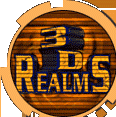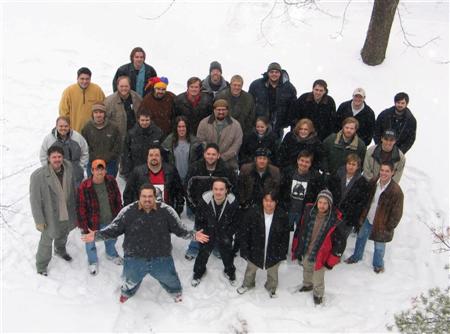The Apogee Legacy #23 - Paul Schuytema
Today we bring you the final "new" issue in the Apogee Legacy series. This edition is definitely one of the more unusual ones, and with the Prey demo being released this Thursday the 22nd, a timely one as well.
This week's edition is with Paul Schuytema. Paul was with 3D Realms for a couple of years in the mid - late 1990's as the project lead on Prey. Now what makes this unusual is that Prey was not released when Paul was here, so his insights into things are not the same as what they would be for someone who has published a game through us.
Still, with Prey on the horizon, and having covered Prey's original project lead (Tom Hall) earlier in the series, we figured we might as well hit Paul up too, and he was glad to send in his answers. Suprisingly for someone who didn't technically put out a game with us, he has a lot to say, so make sure and check it all out.
Past Pioneers of the Shareware Revolution
Issue #23 - Paul Schuytema
1) How did you first come in contact with Apogee?
I first came to know Apogee from their games.. publishing Wolfenstein and Blake Stone and then ROTT.I was working as the game design editor for Computer Gaming World Magazine when I was sent down to Dallas on assignment to cover Duke Nukem 3D before it was released-it was so obvious from looking at that game that it would be a HUGE hit. I remember sitting in his office and asking George: "So how does it feel to KNOW you have a monster hit on your hands?"
I then worked with them to create a feature for CGW on editing in the Build engine. At the time, I was teaching at Monmouth college and we modeled the student center in the engine-it was a ball.deathmatching with my students through the campus union!
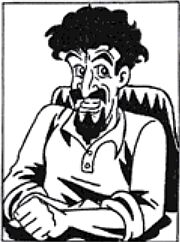
|
| Paul Schuytema's as artwork |
2) Was there a reason you decided to work with Apogee, say versus going on your own or working with another company?
3D Realms lured me away from FASA Interactive. I was working as the lead designer on MechWarrior 3 and Scott Miller approached me about being the project leader on Prey. While I loved the MechWarrior universe and working on the Mech game, the chance to help grow our own game universe and flesh out a deep and interesting game character was too good to pass up.
In the "small world" category…when I left FASA, my producer was Tim Gerritsen…who went on to found Human Head. We became good friends during my time at 3DR and now his team will be the one that allows Prey to see the light of day.
3) Looking back, was there anything Apogee could have done better, regarding the marketing and distribution of your game?
Since Prey wasn't released when I was there, I can't really answer that question. I do have plenty of hindsight, though, on what we could have done better with the game and technology; as they say, hindsight is 20-20!
4) Do you think your game was made better or worse by working with Apogee?
N/A
5) Apogee had a policy of letting the designer or studio retain full intellectual property rights to their game. Nowadays, it's rare to find a publisher who allows this, especially if the publisher is providing the funding. Do you believe that it's best for the creator to retain IP rights? Why or why not?
Since leaving, I've had the chance to create games in which we retained no rights at all and some in which we retained nearly all the rights. I think it depends on the game. The honest truth, though, is that whomever bankrolls the project should probably control the majority of the rights, since they are the chief risk-taker.
In a perfect world, a developer would be able to self-fund up to a prototype state and then partner with a publisher for completion and distribution and then retain the major IP rights. The real trick, though, is having the capitol to fund that prototype. That's not a trivial feat to pull off!
5a) And if applicable, have you benefited from retaining ownership of your own IP?
For the games we've done as Magic Lantern, it's clearly a benefit to own our own IP - it gives us some freedom in putting together distribution deals to maximize our potential return.
5b) Do you think there'll ever be a sequel to your game(s)?
N/A
6) Is there any story/incident that stands out as interesting during your time associated with Apogee?
Yowza... there are so many! Four big ones stand out:
- the first time we showed of portal technology at E3- the gulp of amazement from those who saw it was a real rush for the whole team!
-our team design meetings when we would work on alien race cultures for Prey- the team really came together, time and time again, and we were able to take blue-sky ideas and reel them into nuggets that would fit in the context of an action game
-our team trek to see KMFDM (who was then doing the soundtrack for Prey) in Austin - they were paired with Rammstein, from Germany, and the show was intense and we got to hang out with the band back stage. [ Ed Note: There are still pictures of this event online here. ]
-my last E3 with 3D Realms - for just a few demos, we had a real trick up our sleeve - we did the demo for the press and talked a lot about cool multiplayer stuff and then for a few (I think we only did it two or three times), we had the press sit down and we spun a computer screen towards them and showed them that we could deathmatch right there - that there was game play in addition to the demo - that really wowed them!
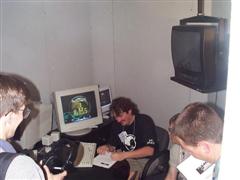
|
| Paul in the back room demo area for Prey at E3 1998 |
7) Apogee was an early pioneer in terms of teaming up with external designers and studios, and continues to do so even to this day (currently working with Human Head Studios on Prey). Why is it that so few other studios do this (mentor and fund outside projects with lesser known teams)?
Every publisher wants to mitigate their risk and taking a chance on a smaller or lesser-known team isn't they way to do that. That's a shame, because it's in those smaller studios that you'll find the real centers of game play innovation.
Also, the idea of mentoring is almost non-existent, which is a shame. Without mentors, small studios are doomed to repeat the mistakes of the past - with mentoring, they can grow and flourish. I remember being on hand when Scott and George started their relationship with Remedy, and I was really impressed with how they coached and helped Remedy get started as they began work on Max Payne - it was something really special.
8) What the biggest difference in the industry nowadays versus when you worked with Apogee?
The consoles have really taken over and everything is "bigger, better, faster, more!" It's very, very hard for small studios, especially US-based studios (where labor costs are high as compared to overseas), to thrive. Also, since so much is ruled by so few, and all the triple-A games need to be multi-platform out of the gates, the barrier for entry is so high as to be almost impossible. Gone are the days when a great idea and a willingness to dive in and learn and work your butt off in your basement will allow you to start a game company - and that's kind of sad.
9) What have you been doing since your time with Apogee?
I started Magic Lantern (insert shameless plug: http://www.lanterngames.com) in 1999 and since then, I produced and designed 20+ games, from the casual to the hard-core (including a hand in one of the early Rainbow Six games). We did this in the cornfields of rural Illinois, and along the way, became very involved in community and economic development.
Late last year, I "turned the asylum over to the inmates" and started a new career with the University of Illinois. Now I work to make games and simulations to support faculty research - really a dream job for me, since I was in academia before I jumped into the game industry.
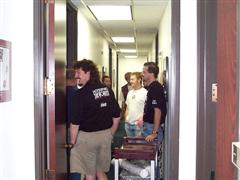
|
| At 3DR HQ around October 1997. |
10) If you're no longer making games, have you thought about returning to this industry? If not, why not?
So far, the grass is pretty green around the ivory tower and I'm making games right now - maybe ask me again in a few years!
11) Looking back, are there any missed opportunities that you wish you'd have jumped on?
Honestly, I think we maybe spent too much time living in the now-defunct world of Glide (3DFX's 3D accelerator API) before we jumped to Direct X - we should have made that leap sooner, but of course, that's hindsight talking!
12) Other than your game(s), what's your favorite game released or produced by Apogee (or 3D Realms)?
Duke Nukem 3D, hands-down. The intensity of the multiplayer action was something I had never experienced before, and the laser trip bombs were just genius!
12a) And what's your favorite 2-4 games released by anyone else?
My all-time favorite is the Age of Empires series - the blend of tactical combat with world building and a real historical feel made the whole series incredible.
I also logged way too much time with the first 3D Jedi Knight game - the poly count was low, the characters looked goofy (by today's standards) and the textures were chunky, but the game play and the sense of scale is still unmatched - and the boss battles rank as the best I've ever played.
13) Is there anything else you'd like to add about your time here or to fans of your title(s)?
During the time I was at 3DR, the industry was really coming into its own - the PC was still the big kid on the block and 3D acceleration was just starting out - and middleware was just becoming an option - it was very exciting to see so much change - but it was also a spooky time in which you had to guess on which API to support and what system specs to target. Did you use MMX? Glide? Direct X? What sound API?
It was also a time of great variety - there were big players in the market, but also small studios were thriving and the game spectrum was very wide indeed - there was so much to play and so little time, we were crafting our own game, after all!
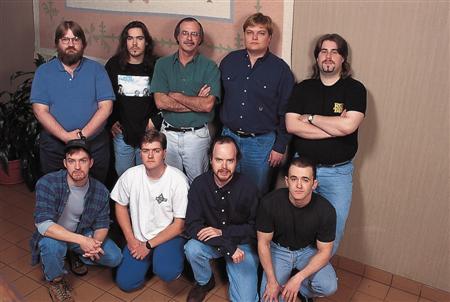
3DR Team in 1995
Back Row L-R: Lee Jackson, David Demaret, Steve Hornback, Mark Dochtermann, Jim Dose Front Row L-R: Chuck Jones, Doug Wood, Tom Hall, William Scarboro
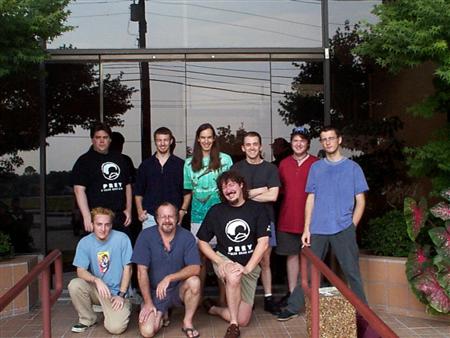
3DR Team in 1998
Back Row L-R: George Broussard, Allen Dilling, Loyal Bassett, William Scarboro, Scott McCabe, Tom Pytel
Front Row L-R: Doug Wood, Steve Hornback, Paul Schuytema
A special thanks goes out to Paul for answering the questions. To be honest, I wasn't quite sure what he'd say when approached, but he was glad to help out.
Make sure and tune in again next Monday morning, when we bring you the final edition in the Legacy Interview Series. The final edition will be a series wrapup with highlights from the rest of the series, and a tribute to two former 3D Realms employees who have since died.
Posted by Joe Siegler on June 19, 2006 at 12:50 PM | Permalink
| Discuss this story on our forums
News Categories: About 3DR / 3DR Staff | The Apogee Legacy
